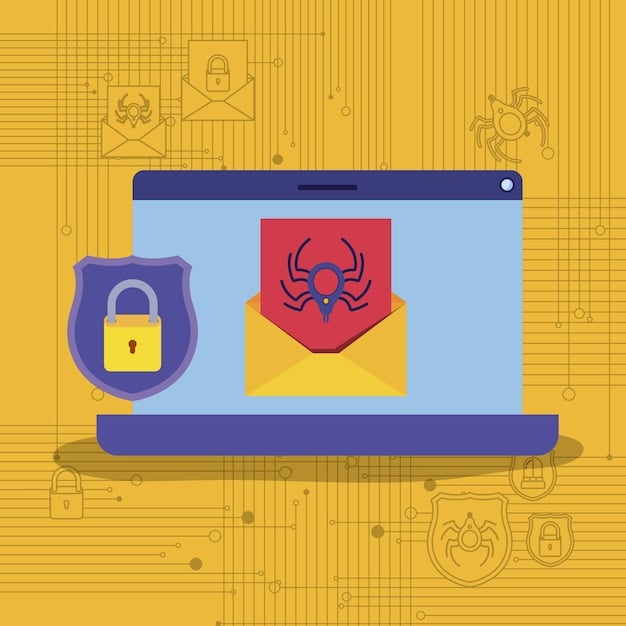Don’t Get Scammed: Protecting Yourself from Online Business Fraud in the US

Online business fraud in the US is a serious concern, with scammers employing various tactics such as fake opportunities, phishing schemes, and investment scams. To protect yourself, it’s crucial to stay informed, verify opportunities, safeguard personal information, use secure payment methods, and report any suspicious activity to the appropriate authorities.
Are you dreaming of starting or growing your online business in the US? It’s an exciting prospect, but the digital landscape also presents opportunities for fraudsters. Knowing how to Don’t Get Scammed: Common Online Business Frauds in the US and How to Protect Yourself is crucial for success and peace of mind.
Understanding the Landscape of Online Business Fraud in the US
The rise of e-commerce and remote work has created a fertile ground for online business fraud in the US. Understanding the different types of scams and how they operate is the first step in protecting your business and your personal finances. From fake business opportunities to sophisticated phishing schemes, the threat is real and constantly evolving.
Common Types of Online Business Scams
Several common scams target online businesses in the US. It’s important to recognize these tactics to avoid falling victim.
- Fake Job Opportunities: Scammers post fake job listings to collect personal information or trick people into paying for training or equipment.
- Phishing Scams: Cybercriminals use deceptive emails, messages, or websites to trick you into revealing sensitive information like passwords or credit card numbers.
- Investment Scams: Fraudsters promote phony investment opportunities that promise high returns with little or no risk.
The Impact of Fraud on Online Businesses
Online business fraud can have devastating consequences for entrepreneurs. Beyond the financial losses, scams can damage your reputation, erode customer trust, and lead to legal problems. Staying vigilant and proactive is essential.

In conclusion, understanding the landscape of online business fraud in the US is crucial for protection. By recognizing common scam tactics and understanding the potential impacts, you can take steps to safeguard your business and personal finances.
Spotting Red Flags: Warning Signs of Online Scams
Recognizing the warning signs of online scams is crucial for protecting your business. Being able to identify suspicious activity can help you avoid becoming a victim of fraud. While scammers are constantly evolving their tactics, certain red flags remain consistent.
Too Good to Be True Offers
Be wary of opportunities that sound too good to be true. Promises of guaranteed success, high returns, or easy money should raise immediate suspicion. Legitimate business opportunities typically involve realistic expectations and hard work.
Unsolicited Communication
Be cautious of unsolicited emails, messages, or phone calls from unknown sources. Scammers often use these methods to initiate contact and lure victims into their schemes. Avoid clicking on links or providing personal information to unsolicited contacts.
Pressure Tactics
Scammers often use pressure tactics to rush victims into making quick decisions. They may create a sense of urgency or scarcity to prevent you from thinking critically about the offer. Take your time to research any opportunity before committing your time or money.
To summarize, spotting red flags is essential for avoiding online scams. Be skeptical of unrealistic promises, unsolicited communication, and pressure tactics. Trust your instincts and always do your research before making any decisions.
How to Protect Your Business from Online Fraud
Protecting your online business from fraud requires a multi-faceted approach. From securing your data to educating your employees, there are several steps you can take to minimize your risk.

Secure Your Data
Protecting your sensitive data is paramount. Use strong passwords, enable two-factor authentication, and regularly update your software. Consider investing in cybersecurity tools like firewalls and antivirus software to safeguard your systems from malware and hacking attempts.
Educate Your Employees
Your employees are your first line of defense against cyber threats. Provide regular training on how to identify and avoid phishing scams, social engineering attacks, and other common fraud tactics. Encourage them to report any suspicious activity immediately.
Use Secure Payment Methods
When processing online payments, use secure payment gateways that employ encryption and fraud detection measures. Avoid accepting payments through unverified or risky channels. Regularly monitor your accounts for unauthorized transactions and chargebacks.
- Strong Passwords: Use a combination of upper and lowercase letters, numbers, and symbols.
- Two-Factor Authentication: Add an extra layer of security to your accounts.
- Regular Software Updates: Keep your software up to date to patch security vulnerabilities.
In conclusion, protecting your online business from fraud requires a proactive and comprehensive approach. By securing your data, educating your employees, and using secure payment methods, you can significantly reduce your risk of becoming a victim of online scams.
Safeguarding Your Personal Information Online
Your personal information is valuable, and protecting it online is essential. Scammers often target personal data to commit identity theft, financial fraud, and other crimes. By taking a few simple precautions, you can minimize your vulnerability.
Be Mindful of What You Share
Think before you share personal information online. Avoid posting sensitive details like your address, phone number, or financial information on social media or public forums. Be cautious about sharing personal data with untrusted websites or apps.
Use Strong, Unique Passwords
Create strong, unique passwords for each of your online accounts. Avoid using easily guessed passwords like your birthday or pet’s name. Consider using a password manager to generate and store your passwords securely.
Monitor Your Credit Report Regularly
Regularly monitor your credit report for any signs of identity theft or fraudulent activity. You can obtain free credit reports from the three major credit bureaus – Equifax, Experian, and TransUnion – once per year.
By being mindful of what you share, using strong passwords, and monitoring your credit report, you can significantly reduce your risk of falling victim to identity theft and other online crimes. Remember, protecting your personal information is an ongoing process that requires vigilance and caution.
Understanding Phishing and How to Avoid It
Phishing is a common tactic used by scammers to trick people into revealing sensitive information. Understanding how phishing works and how to recognize phishing attempts is essential for protecting yourself and your business.
What is Phishing?
Phishing is a type of online fraud where scammers impersonate legitimate organizations or individuals to trick you into providing personal information like passwords, credit card numbers, or social security numbers. Phishing attacks often come in the form of emails, messages, or fake websites.
Recognizing Phishing Attempts
Be wary of emails or messages that ask for personal information, especially if they create a sense of urgency or threat. Check the sender’s email address and website URL for any inconsistencies or misspellings. Avoid clicking on links or downloading attachments from unknown sources.
What to Do If You Suspect a Phishing Attack
If you suspect that you’ve received a phishing email or message, do not respond or click on any links. Report the suspicious communication to the organization or individual being impersonated. Delete the email or message immediately.
- Check the Sender’s Email Address: Look for inconsistencies or misspellings.
- Verify Website URLs: Ensure the URL is legitimate and secure (HTTPS).
- Be Wary of Urgent Requests: Scammers often create a sense of urgency to pressure victims.
In conclusion, understanding phishing and how to avoid it is crucial for online security. By recognizing phishing attempts and taking appropriate action, you can protect yourself from becoming a victim of this common online scam.
Reporting Online Fraud and Seeking Help
If you’ve been a victim of online fraud, it’s important to report the incident to the appropriate authorities and seek help to recover your losses. Reporting fraud can help prevent others from falling victim to the same scam. Several resources are available to assist victims of online fraud.
Reporting Fraud to the Authorities
Report online fraud to the Federal Trade Commission (FTC) and the Internet Crime Complaint Center (IC3). You should also report the incident to your local law enforcement agency. Provide as much detail as possible about the scam, including the names of the scammers, the methods they used, and any financial losses you incurred.
Seeking Help and Support
Several organizations offer help and support to victims of online fraud. Contact your bank or credit card company to report any unauthorized transactions. Consider seeking legal advice from an attorney specializing in fraud and consumer protection. The Identity Theft Resource Center (ITRC) provides assistance and resources to victims of identity theft.
Reporting online fraud and seeking help is essential for protecting yourself and preventing others from becoming victims of the same scams. By taking proactive steps to report fraud and access support resources, you can minimize the damage and begin the recovery process.
| Key Point | Brief Description |
|---|---|
| ⚠️ Recognize Scams | Identify common scams like phishing and fake job offers. |
| 🛡️ Secure Data | Use strong passwords and two-factor authentication. |
| 🕵️♂️ Protect Personal Info | Limit sharing personal info online and monitor credit reports. |
| 🚨 Report Fraud | Report scams to the FTC and IC3 to help prevent future fraud. |
FAQ
Common scams include phishing, fake job opportunities, investment scams, and requests for upfront payments for services that are never delivered.
Use strong, unique passwords, be cautious about sharing personal details online, and monitor your credit report regularly for any suspicious activity.
Do not click on any links or provide personal information. Report the suspicious communication to the organization being impersonated and delete the email.
You can report online fraud to the Federal Trade Commission (FTC) and the Internet Crime Complaint Center (IC3), as well as your local law enforcement.
Provide regular training on how to identify phishing scams, social engineering attacks, and other common fraud tactics. Encourage them to report any suspicious activity.
Conclusion
In conclusion, protecting yourself and your online business from fraud requires ongoing vigilance and a proactive approach. By understanding the common scams, implementing security measures, and staying informed about the latest threats, you can minimize your risk and safeguard your financial future.





